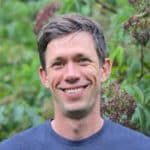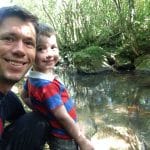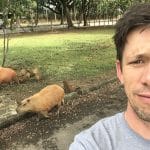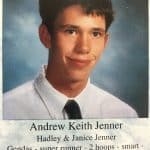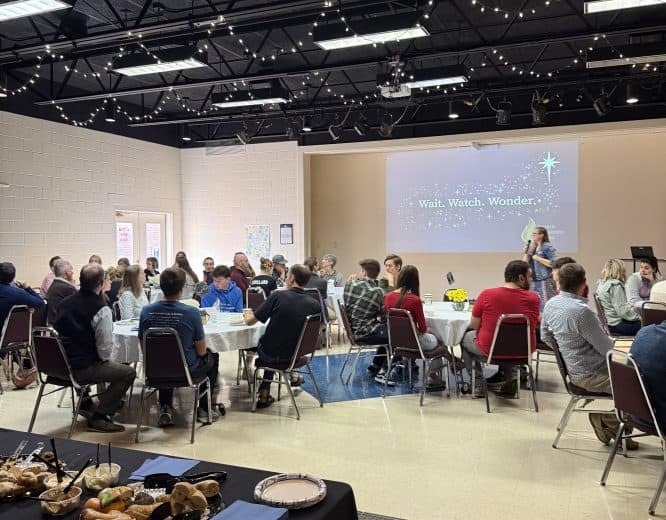Andrew Jenner ’00, Community Engagement Awardee
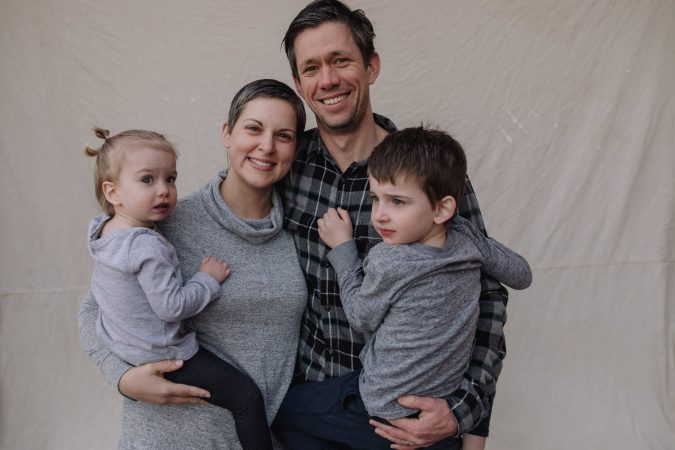
Andrew Jenner ‘00 — Eastern Mennonite School’s 2020 Community Engagement Award recipient — has connected with readers at local and international levels for more than 15 years on everything from city council meetings to obscure science-y things with commitment to truth telling behind every story.
As co-founder of the free, online independent news source, The Citizen (hburgcitizen.com), Jenner’s journalistic endeavors currently serve Shenandoah Valley readers, even as he works full time as manager of Paradise Energy Solutions’ Virginia branch.
Jenner’s 2018 transition from full-time freelance journalism to a more traditional 9-5 job was “a little bit like I finally got called up to the big leagues,” he says. “I got a few hits and now am on to something else.” His journalistic “hits” include publication online and in print with an impressive list including: The Guardian, The Washington Post, The Atlantic, Chicago Tribune, Stuff.co.nz, Barrington Courier-Review, Slate, National Post, Atlas Obscura, Discover Magazine, Stars and Stripes, Modern Farmer, Americas Quarterly, Roads and Kingdoms, The Counter, DRAFT, Scalawag, Daily Voice (South Africa), and Disorder Magazine. In addition, he reported regularly for Harrisonburg’s NPR affiliate, WMRA 90.7 FM, for several years.
While his lengthy stint in freelance journalism brought Jenner the satisfaction of being published in respected outlets, he learned that “forces completely beyond my control were making what once had been a way to earn a decent living no longer tenable… pretty soon thereafter I started looking for a real job – something that well into my mid-30s I never thought I’d ever do again in my life. That’s how I wound up in the solar industry.”
A husband and father, Jenner says, “… you can’t make a living writing online pieces about birds,” referring to “Where do songbirds go to die?” and “The factious, high-drama world of bird taxonomy,” both published online by The Atlantic. This new professional chapter now has him pursuing his journalistic passions on evenings and weekends.
Journey to Journalism
The Citizen’s content is “pretty basic stuff,” Jenner wrote in the August 2, 2020, weekly email “round up” of coverage. “… and more often than not, that’s the whole point – little daily FYIs concerning things that might affect you or your neighbors in this little place we’re lucky to call home.”
That issue provided in-depth coverage of local eviction numbers, racial disparity in housing charges, city council meetings, and one community group’s effort to promote solidarity with the Black Lives Matter movement, all in the Shenandoah Valley.
“I never would have guessed I’d settle in the Valley,” Andrew admits, noting that part of the reason he pursued full-time freelance journalism work was so he wouldn’t be tied to one place by a career.
He counts himself lucky to have lived in Kenya from ages 6-13 with his parents — Hadley and Jan Jenner of Harrisonburg — and siblings. Working with Mennonite Central Committee, his parents took him along to visit remote parts of the country. “I have a bunch of fond memories of what seemed to me like big adventures through parts of the world that few people who don’t live there ever see.”
The experience “probably made me more comfortable than I would have been otherwise, being in situations where I’m different than everyone else, or in being in unfamiliar places,” he says. “It also gave me a perspective on material comforts that manifests itself nowadays in me lecturing my kids about how they have no idea how lucky they are.”
The Jenner family returned from East Africa to the United States in 1996 and settled in Harrisonburg on Andrew’s 14th birthday, where his mother began a position with the Center for Justice and Peacebuilding at Eastern Mennonite University, and he began ninth grade at EMHS.
As a student in both high school and college, Jenner had no inkling that his future might include a career in journalism. He recalls high school English teachers Ernie Martin and John Leonard encouraging him in his writing. And as he grew older, he began to tap into his personal intrigue with a well-crafted piece. “In my senior year of college,” he recalls “I remember reading a piece in The Atlantic that helped me realize how well-written content can have an real impact on people.”
Two books on the Alaska wilderness had a similar impact on him during a summer stint working in a fish cannery in the state. A semester in the Middle East through the cross-cultural program at Eastern Mennonite University — where he earned a bachelor’s degree with a double major in Justice, Peace and Conflict Studies and Environmental Science — was another formative experience. And a year in Germany with the InterMenno exchange program following college, provided ample time for “a ton of reading,” where he discovered one of his favorite authors, Welsh historian, author, and travel writer Jan Morris.
After the year in Germany, he worked for the The Page News and Courier and The Daily News-Record while completing an MFA in creative nonfiction writing through a low-residency program from Goucher College in Towson, Maryland.
In that era, people got their news from a newspaper, television, or the radio. Today’s “news source” for many is social media, a platform that Jenner both eschews and reluctantly embraces at times. The Citizen enterprise ”wouldn’t survive” without Facebook, he admits. “It’s the way 99% of our readership finds our content.”
But that doesn’t make up for the parts he deplores. “I feel very strongly that Facebook has made it easy to spread misinformation,” he says. “People post with no reliable sources and they muddy the waters of what is reliable news.”
Misinformation isn’t his only contention with the platform. “Facebook is cruel,” he contends. “It allows people to treat each other badly and not pay the price of seeing the pain in peoples’ eyes. There’s no cost, so it’s ‘let’s all be mean to each other.’”
Advice for media consumers
What would you tell high school students today about how they get their news? “Learn the media landscape and what the established, reputable news sources are,” Jenner says.
Know those reliable sources and “trust that they’re making honest efforts to live up to the ideals of fairness and truth that we expect of news sources. That doesn’t mean they don’t make mistakes, that everything in them is true or that they don’t always portray things in accurate light. But they’re trying.”
His additional insights:
– If you see something hard to believe that’s shared on social media from a source you’ve never heard of, ignore it. Or at very least, try to find the same news published on other news sites. If you can’t find it elsewhere, ignore it.
– Read The Atlantic and read commentators whose perspectives you disagree with.
– Please don’t go along with this alarming trend where people are going ballistic and canceling subscriptions every time they read an editorial they disagree with.
– Please subscribe to one local media source and one national/international one (and see above when your notions of right and wrong are challenged).
Andrew is married to Rachel, a special education teacher at Massanutten Technical Center, and dad to Alex and Addy. The family is part of Shalom Mennonite Congregation.
The EMS Community Engagement Award is one of two to three opportunities for the school to celebrate and recognize alumni achievements each fall. Typically, awards are presented and alumni share their life experiences with students, faculty, staff and other alumni over Homecoming Weekend, the third weekend of October. Due to COVID-19, EMS’s Homecoming 2020 activities are significantly scaled back this fall.
Andrew will speak in chapel for grades 6-12, however, on Friday, Oct. 16 at 9:55 a.m. Chapel gatherings will be held in student classrooms this year via livestream and pre-recorded video. Andrew’s presentation will be available on the school’s Chapel channel on YouTube.
